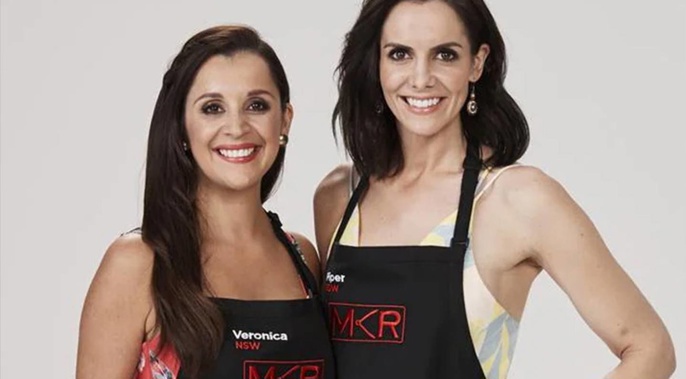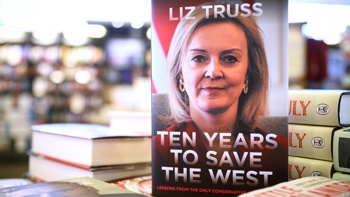
Channel 7 has been ordered to pay a former contestant on My Kitchen Rules more than $22,000 a year in ongoing compensation after she was left unable to work due to "psychological injury" she suffered from her time on the show.
Piper O'Neill, who appeared on the 2019 season of the reality cooking competition with her best friend and fellow beauty queen Veronica Cristovao, lodged a workers compensation claim against the broadcaster in August last year seeking payment of close to $1000 in weekly benefits, starting from December 24, 2018.
O'Neill, 38, was memorably revealed to be having a secret relationship with rival contestant Victor Aeberli in a much-hyped "sex scandal" storyline.
The American-born model and Mrs Australia International 2015 winner was separated from her husband and father of her children Jordan Green during filming.
At the time, Cristovao was highly critical of the show's producers for hyping up the "sex scandal", telling news.com.au's Andrew Bucklow the revelation had been edited as if it were a bombshell but that most contestants knew about the relationship already.
"Everyone knew what was going on between Victor and Piper," she said.
"It's very unfair for Piper. At the end of the day she was bullied at that table. It's just very unfair because it's all public. She's got a family and two kids and this is really unfair."
Veronica and Piper made it into the final eight teams of the 2019 competition before being eliminated in episode 42.
In her workers compensation claim, under her married name Piper Green, she alleged that she had sustained psychological injury over the course of her role in the show "due to vilification and bullying from producers and the network".
She alleged that this involved "over 40-hour work weeks, control over her phone, distortions of her actions and words after editing, victimisation, bullying and harassment and unfair treatment and adverse interactions with other workers, producers and staff".
Seven disputed a number of her allegations, including whether she was classified as a worker, whether she had sustained the injury and become incapacitated as alleged, and if so whether her employment was a substantial contributing factor.
The broadcaster also argued she had not filed her claim for compensation within the time-frame required under the law, and questioned whether "the events alleged by the applicant were not real events or did not actually occur and that the applicant did not suffer a psychological injury or that she had misperceived events", according to a published decision from the Personal Injury Commission of NSW.
The matter was first heard via telephone conference in December 2020, where the commission was informed O'Neill had agreed to an independent medical examination arranged by Seven.
At a second telephone conference in February this year, the parties advised the commission "that the matter was settled" – with the only outstanding issues to be resolved that of the rate of weekly compensation, and the date of commencement.
Commission member Carolyn Rimmer's decision, handed down earlier this month, dealt mainly with the question of whether a $500 per week "allowance" paid by Seven to prepare meals as part of the show should count towards O'Neill's pre-injury average weekly earnings (PIAWE), used to determine the level of ongoing compensation.
Injured workers with no current work capacity are eligible to receive 95 per cent of their base rate of pay prior to their injury for the first 13 weeks of the entitlement period, continuing at a lower rate thereafter.
"The applicant's claim was made on the basis that she has no current work capacity," Rimmer wrote.
"The issue of work capacity was not in dispute. However, there is a dispute as to PIAWE and as to whether the payment of $500 per week by the respondent in addition to the 'fee' of $500 per week as an allowance which should be included in her ordinary earnings."
Under her "Contestant Agreement", Seven paid O'Neill $500 per week to appear on the show, plus an additional $500 allowance "for all ingredients for the meals that I cook as part of the Program as determined by Seven and for the decor for the dinner/s".
Another clause of the contract also allowed for a separate meal allowance of $500 per week when she was required to travel to other cities.
O'Neill argued that Seven's decision to classify part of her remuneration as a "meal allowance" was "arbitrary and did not alter the substantive reality that the applicant was remunerated in the sum of $1000 per week for each week that she worked for the respondent", Rimmer wrote.
In her submissions, O'Neill initially said she was "given an additional $500 a week for food for myself to eat and to aid in the purchase of food that would need to be bought and to practice cooking for the show".
In a later supplementary statement, she clarified that the $500 for food purchases was "for our personal food, which is actually separate from the food that we were using for practice".
"I understood that it was something akin to a meal allowance and that we could use the money in any way we wanted and there were no rules regarding obtaining the payment," she said.
She added that they were never asked to provide receipts to show how the money was spent and that the payment was always made in "one lump sum of $1000".
In response, Seven argued that the additional $500 was a monetary allowance covering the expense of ingredients, and as such was specifically excluded from the calculation of PIAWE under the relevant section of the 1987 Workers Compensation Act.
Rimmer ultimately came down in favour of Seven.
"In my view, it was clear that the allowance of $500 per week was an allowance for ingredients for the meals the applicant cooked as part of the Program and for the decor for the dinner," she wrote.
"While she may have eaten some of the ingredients that she purchased, this was not a meal allowance. There was a separate provision for a meal allowance when required in the Agreement. The applicant did not seem to understand that there was a separate meal allowance of $500 per week when in other cities or in the second phase of the production in Sydney, and it may be that she was confused by the different allowance."
Rimmer said the $500 should not be included in O'Neill's base rate of pay.
"The payment of an allowance for ingredients and decor to be used in the show should not be regarded as an amount to be included in the applicant's earnings," she said.
She ordered that Seven was to pay O'Neill weekly compensation of $475 for the 13 weeks between December 24, 28 and March 25, 2019 – equating to $6175 – continuing at $425 per week from March 26, 2019 onwards, or $22,100 per year.
Contacted for comment on Monday, however, Seven pushed back on the ruling.
"We refuse any claims in this case," a spokesman said. "There has been no settlement or lump sum payment. As this matter is ongoing, we have no further comment."
The spokesman declined to elaborate.
O'Neill's lawyer, Carmine Santone of Santone Lawyers, said in a statement to news.com.au, "Piper is glad that the legal proceedings have been resolved with an Award in her favour but otherwise does not wish to make any further comment at this time."
Her claim comes after a similar case against Seven in 2019, in which a former contestant who was portrayed as a "villain" on House Rules was found to have suffered psychological injury.
The landmark ruling by the NSW Workers Compensation Commission found Nicole Prince was legally an employee of Seven, despite her contract with the network explicitly stating there was no employment relationship.
That ruling, which was first reported by the TV Blackbox website, led to speculation other former reality TV contestants could lodge similar workers compensation claims against broadcasters.
O'Neill's case did not deal with that question as Seven had agreed to make the compensation payments on a "voluntary basis".
In her decision, Rimmer noted that the settlement, "while resolving that she was entitled to workers compensation benefits for work-caused injury, did not include any resolution of the question of whether she was a worker employed under a contract of service, as distinct from a deemed worker under a contract to provide services".
text by Frank Chung, news.com.au
Take your Radio, Podcasts and Music with you









